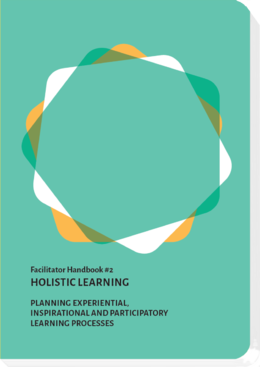The term attitude (or similar terms like position or mindset) has played an important role in history when it comes to describing educators’ skills. Often, it is identified as something they “should have”. There is a great deal of consensus that the “right” attitude is a crucial resource for educational processes. But what does “right” mean, especially in the context of holistic learning? We recommend five basic features of attitude that you can work on to develop your skills as a holistic facilitator.
Facilitators with a holistic attitude...
- Try to understand the feelings and needs of their learners
- Strengthen learners' independence and believe in their existing capacities and potentials
- Pay attention to their relationship with learners (relationship as partnership), they don’t only focus on the content
- Are open to dealing with different opinions and conflicts resulting from them
- Are interested in their self-development as facilitators
Due to our goal of empowerment, it is logical to share as much power as possible and to prepare participants for acting powerful. Therefore we include in a first step our participants as partners and they become responsible for their learning outcome.
In citizenship education the impact of a training or seminar approves in practice - often far long after our work as facilitators is done. When participants need to take the next steps into practice independently from us, we could strengthen their self-esteem and trust in their already existing knowledge and skills. This idea of resource orientation is contrary to the approach of deficit orientation in trainings.
A common approach in pedagogics is to concentrate on helping people finding solutions not based on their problems but rather on increasing their abilities, for reflecting “solutions to problematic patterns in thought and behaviour - and finding solutions dialogically."
Without any question, personal understanding between facilitators and participants may support learning. Such a relationship can help people to find a common language, but inspiring and motivating others involves more than addressing our participants' hearts. We have to address their minds as well. So before we form deep relationships with our students and participants, it is helpful to reflect on the situation.
Empathy is a human quality that helps people to understand, to show authentic reactions or to mobilize their capacities. It's the ability to build a trustful relationship, a skill and a precondition for the participative and respectful facilitation of groups.
Training, teaching or youth work require specific competencies of facilitators and can be perceived as well as a learning field for facilitators. We introduce two materials - a competency framework and a learning portfolio for facilitators.
As a facilitator you take on responsibility in a leading role. Different people have different styles to deal with this. Although facilitating in an empowering way means applying your approach to the needs of the target group, this can imply many different things. What does it mean for you?
Empowerment is a process that requires eye-level cooperation between facilitator and learners. When the boundaries between facilitator and participants become more fluid, this can present a challenge to modern facilitators. How would you like to define yourself in relation to your participants.
How do you deal with diversity in your group? A self-assessment.
Two main approaches of guiding constructive conversation are available for facilitators. Advice as an active proposal and coaching as a method that builds a setting in which learners come up with solutions to their challenges on their own.
Feedback is a method that was developed to improve the quality of interpersonal communication, in terms of relevance (giving relevant information) as well of moral quality (showing interpersonal respect). As outside perceptions are sometimes different to internal perceptions, it is a useful tool for gaining insight on how the own action, skills and communication are perceived through other people.
Before leading a group through a learning process,facilittaors can create a list of learning objectives and set a scale next to each skill or ability they would like to improve upon during their moderation.








